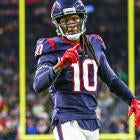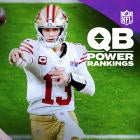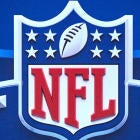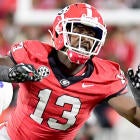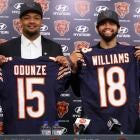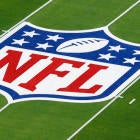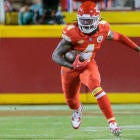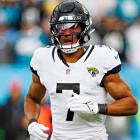There may be a changing of the guard in the NFC West, even though the results may not show on the field immediately in 2020. The Arizona Cardinals took major steps in free agency in improving their team in an attempt to finally climb out of the division basement, where the franchise has resided the past two seasons. However, in the short term, the San Francisco 49ers are still the class of the division, primed to make another Super Bowl run with one of the best defenses in the NFL. The Seattle Seahawks aren't too far behind the 49ers and are always a Super Bowl contender with Russell Wilson as their quarterback. The 49ers-Seahawks battles the NFC West saw in 2019 should be a clash of the titans for the next few seasons, but keep an eye on the Cardinals.
And what about the Los Angeles Rams? Wasn't that long ago Los Angeles was representing the NFC in the Super Bowl and appeared set to earn a championship or two over the next several seasons. Poor personnel moves have set the Rams back, even though they still have the talent to compete for the division crown and a third playoff berth in four years. Below, we'll grade how each of the NFC West teams fared in the first wave of free agency.
Arizona Cardinals
Notable additions: WR DeAndre Hopkins (Texans, via trade), DT Jordan Phillips (Bills), OLB Devon Kennard (Lions), OLB De'Vondre Campbell (Falcons), DT Trevon Coley (Colts)
Notable losses: RB David Johnson (Texans, via trade), DE Rodney Gunter (Jaguars), ILB Joe Walker (49ers)
The Cardinals didn't just ace free agency, they crushed the opening week and lapped the division in the process. Not only did Arizona fire David Johnson's bloated contract into the sun, but they were also able to acquire DeAndre Hopkins while doing so. What a stroke of genius by GM Steve Keim to actually convince Bill O'Brien to award the franchise Hopkins, giving reigning rookie of the year Kyler Murray another wide receiver (in addition to Larry Fitzgerald and Christian Kirk) to throw to. All Arizona had to give up was Johnson (who fell out of favor and had a massive contract), a second-round pick (No. 40 overall) and a 2021 fourth-round pick to Houston. Oh, and they got a 2020 fourth-round pick back from Houston as well.
Hopkins immediately becomes the No. 1 in Arizona and will continue to grow with Murray for years to come. Keeping Fitzgerald exclusively in the slot will make the Cardinals better, especially with Hopkins, Kirk and Andy Isabella providing the firepower on the outside. Kirk can also move into the slot in certain situations.
The Cardinals didn't stop with the addition of Hopkins. The front office made major strides to improve a defense that ranked 28th in points allowed and dead last in yards allowed in 2019. Arizona stabilized the linebacker group with the additions of Devon Kennard (three years, $20 million) and De'Vondre Campbell (one year, $6 million), pairing them with Jordan Hicks in the middle. Chandler Jones is arguably the best pass rusher in the NFL and the Cardinals gave him some interior pass rush help with the signing of Jordan Phillips (three years, $30 million) and Trevon Coley. The Cardinals didn't add much to improve the 31st-ranked pass defense, but a better pass rush will aid in assisting that unit. Arizona also gave the transition tag to Kenyon Drake (643 yards, 8 TD, 5.2 yards per carry) and still have Chase Edmonds as the No. 2 running back.
The Cardinals hit a massive home run this offseason, gaining a lot of ground on their NFC West competitors. May not be long before Arizona starts contending for a division title.
Grade: A+
San Francisco 49ers
Notable additions: DE Kerry Hyder (Cowboys), LB Joe Walker (Cardinals), WR Travis Benjamin (Chargers), G Tom Compton (Jets)
Notable losses: DL DeForest Buckner (Colts, via trade), WR Emmanuel Sanders (Saints), TE Levine Toilolo (Giants), DT Sheldon Day (Colts), DE/DT Anthony Zettel (Vikings)
The 49ers deserve credit in being able to keep 10 of their 11 starters on defense from their NFC Championship team from last season, which isn't an easy task for a conference champion. It certainly helped Jimmie Ward turned down more money from the Raiders to stick around, keeping the secondary intact. Agreeing to a five-year extension with Arik Armstead was crucial for the 49ers defensive line, but they gave up DeForest Buckner in a trade to the Colts, getting their first-round pick (No. 13 overall). Buckner is the only starter that won't be back on the second-ranked defense from 2019.
The 49ers had a few depth signings, bringing Kerry Hyder in on a one-year deal and re-signing Ronald Blair for insurance at defensive end. They are banking on Travis Benjamin to add more speed to a young wide receiver corps, especially after losing Emmanuel Sanders to the Saints. The 49ers also added Joe Walker to compete for a backup job at linebacker. San Francisco also made a change at right guard, releasing Mike Person and snagging Tom Compton, who is familiar with head coach Kyle Shanahan from the Redskins and Falcons days.
San Francisco didn't have a lot of cap room to make a splash signing, which cost them Buckner once it became clear they weren't going to sign him to a contract extension. The 49ers didn't improve on offense, deciding to hold out on a weak free agent wide receiver class. Odell Beckham isn't coming to San Francisco either, so the 49ers should address the position with that extra first-round pick. They also have to sign George Kittle to an extension.
The 49ers didn't allow Armstead to walk and kept the majority of their Super Bowl-caliber defense intact. They didn't get better, but they didn't get worse either (even after losing Sanders). Mission accomplished this offseason.
San Francisco should still be the favorites in the division.
Grade: B
Seattle Seahawks
Notable additions: TE Greg Olsen (Panthers), OLB Bruce Irvin (Panthers), G B.J. Finney (Steelers), T Brandon Shell (Jets), WR Phillip Dorsett (Patriots)
Notable losses: T George Fant (Jets), DE Quinton Jefferson (Bills)
Hard to give a fair grade for the Seahawks offseason when we still don't know where Jadeveon Clowney is headed. The longer Clowney goes without a deal, the better chances he returns to Seattle at their price. As of right now, the Seahawks offseason hasn't been impressive as they are still left trying to figure out ways to protect Russell Wilson. Seattle lost George Fant to the Jets and ended up paying Brandon Shell starter money (two years, $11 million) to essentially replace Germain Ifedi at right tackle. Cedric Ogbuehi (one year, $2.3 million), who was used as a swing tackle and extra tight end in heavy packages, is the replacement for Fant. Ogbuehi is a versatile lineman, but he is a downgrade. The Seahawks are also paying B.J. Finney (two years, $9.5 million to be a starter either at center or guard. They'll see if Finney is good enough to start after being a backup with the Steelers.
Seattle needs to improve its pass rush after having the second-fewest sacks in the league last season. While the Seahawks wait for Clowney, they brought Bruce Irvin back and are banking on Jarran Reed (two years, $23.5 million) to live up to the 2018 version that finished with 10.5 sacks. There are still some good edge rushers left on the market, meaning Seattle has some time in case Clowney doesn't return. Losing him would be a huge blow for a nonexistent pass rush, especially since Clowney is also excellent at stopping the run.
The signing of Greg Olsen (one year, $7 million) is a major boost to an offense that already has D.K. Metcalf and Tyler Lockett at wide receiver and Chris Carson and Rashaad Penny at running back (assuming both backs will be healthy by Week 1). Olsen may be 35, but showed he can still contribute when healthy. He'll also split time with Jacob Hollister and Will Dissly, which will limit the beating he took on the line of scrimmage over the past few seasons with the Panthers.
Not addressing the defensive line gives the Seahawks this grade, which really is contingent on Clowney and his return. Seattle is still a playoff team (at worst), even with the questionable additions on the offensive line.
Grade: C+
Los Angeles Rams
Notable additions: OLB Leonard Floyd (Rams), DT A'Shawn Robinson (Lions)
Notable losses: OLB Dante Fowler Jr. (Falcons), ILB Cory Littleton (Raiders), RB Todd Gurley (Falcons), CB Nickell Robey-Coleman (Eagles)
The Rams are starting to show why their front office isn't as great as many thought -- that was just two seasons ago. Sure trading for Jalen Ramsey, Brandin Cooks, Aqib Talib, Marcus Peters, and Dante Fowler Jr. looked good initially, but it left Los Angeles with a lot of big contracts and few draft picks. The Rams aren't finding any takers for Cooks at the moment and shipped away Peters and Talib at the trade deadline last October.
In addition, they gave Jared Goff $57 million guaranteed ($134 million total if Goff sees the life of the deal) and still have to pay Ramsey at some point. The massive contract to Gurley blew up in the Rams' face, forcing them to release him just two years after he signed the extension. They also paid a huge amount to Aaron Donald, which also affected Los Angeles in retaining their free agents.
The end result was Fowler and Littleton leaving, creating a huge void in their defense. Los Angeles quickly replaced Fowler with Floyd (one year, $10 million) and signed Robinson (two years, $17 million), who was a part-time player with the Lions. They were fortunate enough to retain Brockers after a three-year, $30 million deal with the Ravens fell through. Los Angeles overpaid for Robinson, as desperate times call for desperate measures. The Rams still have a long way to go and only $6.9 million in cap space (per Over The Cap) to work with.
Los Angeles kept Andrew Whitworth and Austin Blythe on the offensive line, one that wasn't good in 2019. There were better options than Whitworth, but the Rams just couldn't afford them. The Rams could reload in the draft, but they have just six picks this year and five picks slated for 2021 (with no first-round pick either year).
The Rams could find themselves in the NFC West basement very soon. All thanks to many "win-now" moves that didn't pan out.
Grade: D













